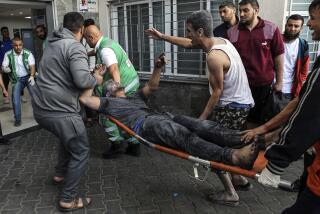U.N. WATCH : Priority Mission
- Share via
By agreement, the United States and the former Soviet Union on Wednesday will stop pouring weapons and ammunition into Afghanistan. We hope that the end of those decade-old arms pipelines also marks the beginning of more relief to the millions of Afghans who have suffered so greatly.
War has raged in this desolate, mountainous land since a Kremlin-backed Marxist government took power in 1978 and triggered armed resistance from the Muslim opposition. The subsequent Soviet military invasion of Afghanistan in 1979 was intended to quash opposition to Moscow’s chosen candidate in Kabul. Instead, Soviet troops met with fierce, continuous resistance from the Afghan population.
Afghanistan became the Soviet Union’s Vietnam, a bloody battleground where “victory” became hard to define and increasingly elusive. When Moscow finally gave up and withdrew its troops in 1989, warring rebel groups continued the deadly conflict. Thirteen years of war have left more than a million Afghans dead, 2 million people disabled and an estimated 5 million more--the world’s largest refugee population--stranded in camps in Pakistan and Iran.
Those refugees as well as Afghans who remained in the country desperately need help. The risk of famine this winter is high. The United Nations has set modest goals in 1992 for providing food, water, shelter and medical care and for clearing mines. We hope that Boutros Boutros Ghali, the new U.N. secretary general, makes this aid--and more--a top priority.
More to Read
Sign up for Essential California
The most important California stories and recommendations in your inbox every morning.
You may occasionally receive promotional content from the Los Angeles Times.













